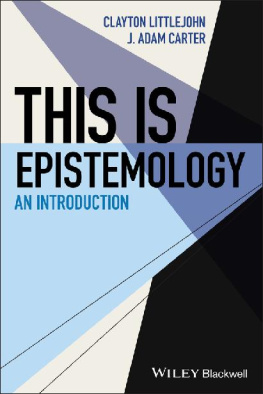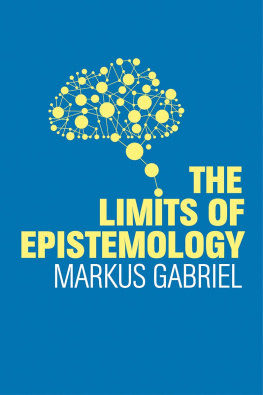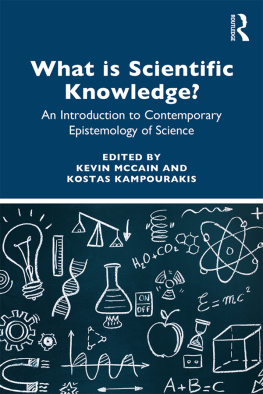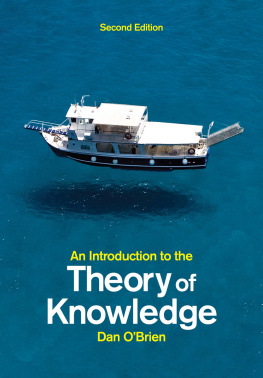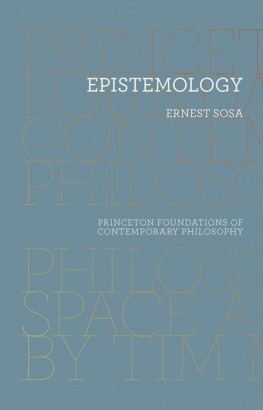THIS IS EPISTEMOLOGY
Series editor: Steven D. Hales
Reading philosophy can be like trying to ride a bucking broncoyou hold on for dear life while transcendental deduction twists you to one side, causa sui throws you to the other, and a 300word, 300yearold sentence comes down on you like an ironshod hoof the size of a dinner plate. This Is Philosophy is the riding academy that solves these problems. Each book in the series is written by an expert who knows how to gently guide students into the subject regardless of the readers ability or previous level of knowledge. Their readerfriendly prose is designed to help students find their way into the fascinating, challenging ideas that compose philosophy without simply sticking the hapless novice on the back of the bronco, as so many texts do. All the books in the series provide ample pedagogical aids, including links to free online primary sources. When students are ready to take the next step in their philosophical education, This Is Philosophy is right there with them to help them along the way.
This Is Philosophy, Second edition
Steven D. Hales
This Is Philosophy of Mind
Pete Mandik
This Is Ethics
Jussi Suikkanen
This Is Political Philosophy
Alex Tuckness and Clark Wolf
This Is Business Ethics
Tobey Scharding
This Is Metaphysics
Kris McDaniel
This Is Bioethics
Ruth F. Chadwick and Udo Schuklenk
This Is Epistemology
J. Adam Carter and Clayton Littlejohn
This Is Philosophy of Religion
Neil Manson
Forthcoming:
This Is Philosophy of Mind, 2nd edition
Pete Mandik
This Is Philosophy of Science
Franz-Peter Griesmaier and Jeffrey A. Lockwood
This edition first published 2021
2021 John Wiley & Sons, Inc.
All rights reserved. No part of this publication may be reproduced, stored in a retrieval system, or transmitted, in any form or by any means, electronic, mechanical, photocopying, recording or otherwise, except as permitted by law. Advice on how to obtain permission to reuse material from this title is available at http://www.wiley.com/go/permissions.
The right of J. Adam Carter and Clayton Littlejohn to be identified as the authors of this work has been asserted in accordance with law.
Registered Office
John Wiley & Sons, Inc., 111 River Street, Hoboken, NJ 07030, USA
Editorial Office
111 River Street, Hoboken, NJ 07030, USA
For details of our global editorial offices, customer services, and more information about Wiley products visit us at www.wiley.com.
Wiley also publishes its books in a variety of electronic formats and by printondemand. Some content that appears in standard print versions of this book may not be available in other formats.
Limit of Liability/Disclaimer of Warranty
While the publisher and authors have used their best efforts in preparing this work, they make no representations or warranties with respect to the accuracy or completeness of the contents of this work and specifically disclaim all warranties, including without limitation any implied warranties of merchantability or fitness for a particular purpose. No warranty may be created or extended by sales representatives, written sales materials or promotional statements for this work. The fact that an organization, website, or product is referred to in this work as a citation and/or potential source of further information does not mean that the publisher and authors endorse the information or services the organization, website, or product may provide or recommendations it may make. This work is sold with the understanding that the publisher is not engaged in rendering professional services. The advice and strategies contained herein may not be suitable for your situation. You should consult with a specialist where appropriate. Further, readers should be aware that websites listed in this work may have changed or disappeared between when this work was written and when it is read. Neither the publisher nor authors shall be liable for any loss of profit or any other commercial damages, including but not limited to special, incidental, consequential, or other damages.
Library of Congress CataloginginPublication Data is applied for
9781118336823 (Paperback)
Cover design: Wiley
ACKNOWLEDGMENTS
The authors are grateful to Steven D. Hales for his encouragement, support, and patience during the completion of this book, and to three anonymous referees whose extensive comments on the initial version of the manuscript have improved the final version greatly.
This Is Epistemology was written between 2014 and 2020, and the narrative arc that emerged reflects a range of epistemological topics that the authors themselves (sometimes collectively, sometimes individually) hold near and dear. The result is, we hope, a more comprehensive and apt picture of epistemology than either of us would have presented individually.
Adam would like to thank those epistemologists who have shaped his own reading of the lay of the land in epistemology. There are many, but two who stand out in particular are Duncan Pritchard and Ernest Sosa. Both have been in different ways invaluable guides. In addition, Adam would like to thank Chris Kelp and Mona Simion for very helpful discussion, Clayton Littlejohn for being a great coauthor throughout, and Emma C. Gordon for years of loving support (especially during the chapter on the a priori, which was trying for us both).
Clayton would like to thank his students, colleagues, and former teachers for philosophical conversation, Steven Hales for encouragement, and Amy Revier for her support. He also wants to thank his coauthor for his excellent work on this project.
INTRODUCTION
I.1 What Is Epistemology?
I.1 If you catch an epistemologist in a pithy moment, and you ask So, what is epistemology? they might say something like this: Epistemology is the branch of philosophy that concerns the nature and scope of human knowledge. This isn't a bad answer. Epistemologists do care about what knowledge is (i.e. its nature ). As a case in point, just look at their track record: since about the early 1960s, epistemologists have left a paper trail that includes just about every attempt you can think of to fill in this blank:
S knows that p if and only if ________.
So, epistemologists clearly do care (a lot that's decades of effort!) about what knowledge is, about its nature. In case you're wondering, for the purposes of the above puzzle, S can be any person (including yourself) and p can be any proposition. A proposition the kind of thing we assert and deny, and which is capable of being true and false is often represented by a that clause; for example, you might know that it is raining or that Scotland is north of England . Filling in the above blank requires specifying the necessary and sufficient conditions for anyone's knowing any proposition viz. the conditions for propositional knowledge .
I.2 Does the puzzle seem easy? Prior to a famous paper in the early 1960s at least, the following answer to the puzzle seemed good enough:
A subject, S, knows that a proposition, p , is true iff (i) p is true, (ii) S believes that p , and (iii) S is justified in believing that p (e.g. believes p on the basis of good reasons).

